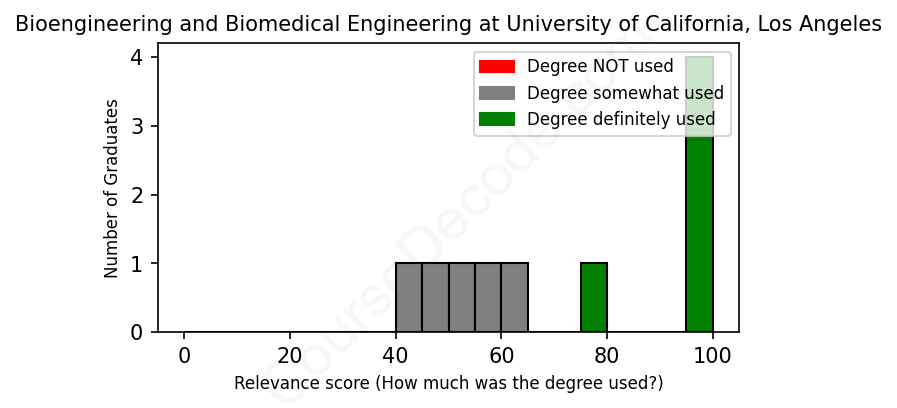
First, some facts. Of the Bioengineering and Biomedical Engineering graduates from University of California, Los Angeles we've analyzed , here's how many have used (or NOT used) their degree in their career:

These are estimates based on AI analysis of 10 LinkedIn profiles (see below).
The verdict? Slightly above average. Overall, with an average relevance score of 72%, Bioengineering and Biomedical Engineering graduates from University of California, Los Angeles have a slightly higher likelihood (+5%) of finding work in this field compared to the average graduate across all fields:
And for comparison, here's the chart for all profiles we've looked at across all degrees.
Also, after graduating, 70% of these graduates have pursued further education other than another Bachelor's degree (such as a Masters degree or other), compared to the average across all profiles of 35%. This suggests you may need more than just a Bachelors degree to be competitive as a Bioengineering and Biomedical Engineering graduate.
See the details:
|
Relevance score: 46% We think this person has gone into a career only somewhat relevant to their degree. We think this person has gone into a career only somewhat relevant to their degree.
DEGREE INFOGraduated in 2015 from University of California, Los Angeles with a Bachelors Degree in Bioengineering and Biomedical Engineering. No other secondary education since. JOB HISTORY SINCE GRADUATIONManufacturing Associate HireGenics Aug 2015 - Mar 2016 Information Technology Support Technician  UCLA May 2016 - Present ABOUTWelcome! My name is [NAME REMOVED] Zhu and I am an IT Support Technician with an interest in furthering my career within the tech industry. |
The top 10 most common jobs done by the graduates we've analyzed (ranked most common to least) are:
Based on the LinkedIn profiles examined, it seems that graduates from UCLA with a degree in Bioengineering and Biomedical Engineering have pursued a variety of job roles that span research, clinical affairs, data analysis, and even positions that seem somewhat tangential to their studies. Some of the most common job titles include Clinical Research Consultant, Research Scientist, and various roles within clinical affairs, including writing and management positions. These jobs often leverage aspects of their bioengineering education, particularly those that are directly tied to research and product development in biomedical contexts.
However, not all positions held by these graduates are highly relevant to their field of study. While many roles do apply bioengineering principles—especially those in research settings, clinical trials, and quality engineering—others like manufacturing or IT support positions seem to require a more general skill set that doesn’t necessarily align with their academic training. Overall, it's a mixed bag, with many graduates successfully finding jobs that utilize their specialized knowledge, but also a notable number taking paths that don't fully capitalize on their bioengineering backgrounds. This suggests that while a degree in Bioengineering and Biomedical Engineering opens up numerous opportunities, the relevance of jobs can vary significantly from one role to another.
Here is a visual representation of the most common words in job titles for Bioengineering and Biomedical Engineering graduates (this is across all Bioengineering and Biomedical Engineering graduates we've analyzed, not just those who went to University of California, Los Angeles):

From the looks of it, graduates from UCLA with degrees in Bioengineering and Biomedical Engineering tend to follow some exciting career paths after they leave school. Right after graduation, many of them land jobs related to research roles, clinical affairs, or quality engineering. For instance, graduates from 2014 and 2015 have worked their way up in various research and clinical roles, starting as things like clinical lab accessioners or research associates and then quickly moving into more substantial positions or managerial roles. It seems like the first jobs they secure often set the stage for impressive advancements in their careers over the next five to ten years, eventually landing roles in major companies like Pfizer and Abbott or prestigious institutions like Stanford and the University of Washington.
However, it's not all roses for everyone. Some graduates have taken a bit longer to find their niche. A few have ended up in roles that aren't directly related to bioengineering, like IT support. But, generally speaking, those who stick closely to their field seem to be thriving. Five years down the line, many graduates find themselves in positions like Senior Associate Scientist or Clinical Affairs Specialists, proving that if graduates use their degrees wisely and keep pushing themselves, they can really build great careers in bioengineering and beyond. It's a mixed bag, but there's definitely a trend of success for those who follow their passion and stay connected to the biomedical field!
Getting a Bachelor’s degree in Bioengineering or Biomedical Engineering at a place like UCLA can definitely be challenging! These programs are usually packed with tough courses in math, physics, and biology, plus a mix of engineering principles. Students often find themselves juggling complex problems and lab work, so it’s not the kind of degree you can breeze through without putting in the effort. While some might find it easier if they have a strong science background, on the whole, it’s generally considered a rigorous and demanding field of study. If you’re passionate about the subject and willing to put in the time, it can be really rewarding, but just know it’ll require some serious commitment and hard work!
Most commonly, in the LinkedIn profiles we've looked at, it takes people 4 years to finish a Bachelor degree in Bioengineering and Biomedical Engineering.
So, looking at these UCLA grads in Bioengineering and Biomedical Engineering, it seems like most of them have landed pretty decent jobs that likely pay well, especially considering the fields they're in. A few of the older grads have moved on to roles like Data Scientist and Senior Associate Scientist at big companies like Pfizer, which typically come with good salaries and benefits. Even the ones who have had shorter stints in entry-level or contract positions are making their way up into more specialized roles, which is a solid sign of career growth. The newer grads, like the one working as a Crew Member at Trader Joe's, might be starting off in lower-paying jobs, but it’s not uncommon for fresh graduates to take on something temporary while they build experience, so they'll usually level up soon. Overall, it looks like most of these folks are on a path toward making decent money, especially as they gain more experience!
Here is a visual representation of the most common words seen in the "about" section of LinkedIn profiles who have a Bachelor degree in Bioengineering and Biomedical Engineering (this is across all Bioengineering and Biomedical Engineering graduates we've analyzed, not just those who went to University of California, Los Angeles). This may or may not be useful:

Here are all colleges offering a Bachelor degree in Bioengineering and Biomedical Engineering (ordered by the average relevance score of their Bioengineering and Biomedical Engineering graduates, best to worst) where we have analyzed at least 10 of their graduates:
| College | Score | Count |
|---|---|---|
 Clemson University Clemson University
|
88 | 16 |
 University of Washington University of Washington
|
82 | 11 |
 University of California, Los Angeles University of California, Los Angeles
|
72 | 10 |